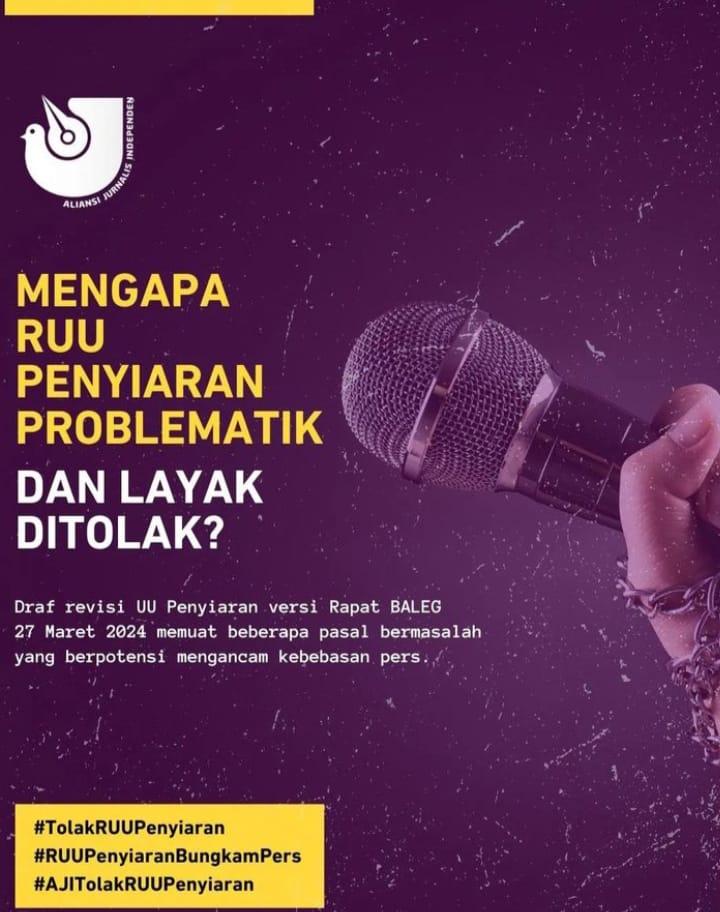The draft revision of the Law on Broadcasting by the House of Representative Body for law (27 March 2024) writes a number of articles in the draft law that are problematic and potentially threaten free press. A number of points are described below.
1. The Broadening of Definition – Broadcasting
This needs careful consideration because the revision on the Law on the Broadcasting details the types of broadcasting technology (terrestrial, cable, satelite, internet, etc.) and adds the 'nature' of broadcasting, which originally was 'only can be accepted unanimously and simultaneously' and then becomes 'can be accepted simultaneously and/or can be re-accesses.' (source: remotivi analysis)
The 2022 Law on Broadcasting only regulates broadcasting corporations. The draft revision, meanwhile (per March 2024), adds new legal subject – digital broadcasting platforms (as is contained in articles 5 and 6 (5A).
Communication lecturer at Gadjah Mada University, Wisnu Praseya says, citing Indonesian Independent Journalist Alliance that by broadening the definition of broadcasting, there may be potentials for threats against free press and free expression in digital platform. This is especially critical as there are new alternative media.
2. Prohibition for Investigative Journalism
Article 508 ayat 2(c) re. Standard Broadcasting Content which here specifically prohibits "exclusive broadcasting of investigative journalism."
Wisnu Prasetya argues, as cited by AJI Indonesia, that: “there is prohibition to broadcasting investigative journalism. The articles are absurd and tend to be anti-free press and specifically target investigative journalism. And referring to the first point, the definition of broadcasting is broadened, to include, not only major media, but also investigative journalism done through the internet, online media, or even social media.”
The article that prohibit investigative journalism is against Article 4 (2) of The Law on the Press that states there is no censor, publication closure, or broadcasting prohibition on national press
Pasal larangan penayangan jurnalisme investigasi bertentangan dengan Pasal 4 Ayat 2 Undang-Undang Pers yang menyatakan bahwa terhadap pers nasional tidak dikenakan penyensoran, pembredelan, atau pelarangan penyinaran.
The Prohibition’s Impacts on the Free Press
Safenetvoice notes that the articles will become censorship instruments that limit press freedom, free expression, and rights to information of internet users. These articles are as follows:
Articles 8A and 34F (2e) : require digital platforms to verify contents with the Indonesian Broadcasting Commission. But, there is no explanation of what kind of verification is necessary.
Articles 8C and 50 (3) : expand the authority and task of the Indonesian Broadcasting Commission to include monitoring of digital contents
Article 36A (2) : Give authority to the Indonesian Broadcasting Commission to sanctions digital platforms that violate the rules. The sanctions include givig recommendations to the Minister for Communication and Information to cut access to digital platform contents.
Article 23 : Prohibit ownership of digital platform by organisations/communities that represent the propaganda interests of banned groups or organisations by engaging in illegal activities.
Article 28A : Prohibit digital platform owned by subscription providers that broadcast dangerous contents to national safety, threaten national defense and security, that are contrary to the moral values, that contains pornography and sadistic acts, that pit religions, ethnicity, and race against each other, and broadcasting of LGBT behaviours.
Article 46A (2) : Prohibit advertising materials, use of advertisement to promote LGBT behaviours that violate decency values, respectability, and moral values.
Article 50B (2) : Prohibit contents that contain investigative journalism, negative lifestyle, violence acts and/or victims of violence, LGBT behaviour, fake news, libel, insults, defamation, and blasphemy. (Ast)












